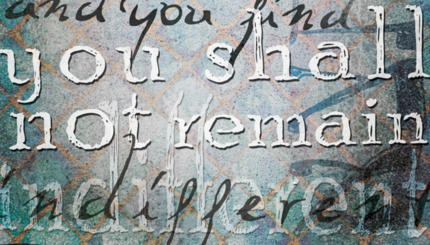Commentary on Parashat Vayishlach, Genesis 32:4-36:43
Parashat Vayishlach starts with fear: specifically, Jacob’s fear. Twenty years previously, Jacob had fled his childhood home to escape the murderous rage of his brother Esau. Now finally headed home, Jacob anticipates a fraught and downright dangerous reunion with Esau, so he takes measures to prepare and protect himself and his family: “Jacob was greatly frightened; in his anxiety, he divided the people with him, and the flocks and herds and camels, into two camps, thinking: If Esau comes to the one camp and attacks it, the other camp may yet escape.” (Gen. 32:8–9)
After dividing his family in two, Jacob culls gifts from his flocks and herds and sends them with servants to appease the brother he worries might still be seething. Then, he sends his whole family across the river Jabbok and remains alone on the opposite bank where he wrestles all night with a mysterious stranger. At daybreak, the stranger concedes defeat and gives Jacob a new name: Israel. Then Jacob crosses the river and further arranges his immediate family in anticipation of an unfriendly encounter: “… He divided the children among Leah, Rachel, and the two maids [Bilhah and Zilpah], putting the maids and their children first, Leah and her children next, and Rachel and Joseph last.” (Gen 33:1–2) This final arrangement makes clear who matters least and who most — Rachel and her children, most beloved, are literally sheltered behind the rest. The maidservants are placed in the most vulnerable position at the front.
How did Bilhah, Zilpah, Leah, and Rachel feel, not only split up but physically ranked from least to most precious? How did Jacob’s children experience it? The Torah doesn’t say. Jacob’s actions have a callousness to them — as if he views his family and household as mere assets. The “people with him” and the “flocks and herds and camels” are described in one breath, and treated in the same manner. Their identities are largely flattened to mere numbers; their value ranked on a sliding scale.
Jacob’s treatment of his family reverberates throughout the rest of Genesis and beyond. The next story we encounter is the rape of Jacob’s daughter Dinah, who is attacked when she goes out to visit with “the daughters of the land.” (Gen. 34:1) What was she seeking beyond her family? What needs were unmet, what parts of her unseen? The latter chapters of Genesis tell of the distance, alienation and attempted fratricide that plague Jacob’s twelve sons.
With your help, My Jewish Learning can provide endless opportunities for learning, connection and discovery.
The Bekhor Shor, a medieval commentator, comments on Genesis 32:8 that a motivator of Jacob’s actions was not knowing whether Esau would attack. Jacob acts self-protectively out of that fear, rather than thoughtfully in the present moment, defending against and imagined foe instead of responding to the needs of those around him. But these actions proved unnecessary. Jacob’s brother, who once sought his death, greets him with an embrace. Painfully, the damage he caused when he treated his household as merely endangered possessions turns out to have been completely unnecessary.
The time-traveling power of fear — always imagining future calamities rather than engaging with the present — undermines our ability to treat each other as people in our fullness. In Jacob’s treatment of his family, I see resonance with Jewish continuity discourse: a focus on numbers rather than each precious and immeasurably important soul. The writer Rokhl Kafrissen has described the “continuity agenda” as “ a communal agenda with control of private romantic choices, and women’s bodies and fertility, at its heart.” This agenda focuses not on depth or meaning, but on a fear of losing numbers in the future — and in service of that fear, people (especially women) become mere bodies.
It is no coincidence that the Jewish people, the people of Israel, acquire our name at the moment in this parasha where Jacob is not fixated on some imagined future crisis but forced to reckon with the present: when he wrestles the mysterious figure who grabs hold of him. This posture of absolute presence is one we ought to strive for ourselves. We must meaningfully engage with what is right in front of us: the challenges, the opportunities, the needs and most of all the individuals in our here and now. That is the best way to build; not by focusing on imagined demons of the future.



